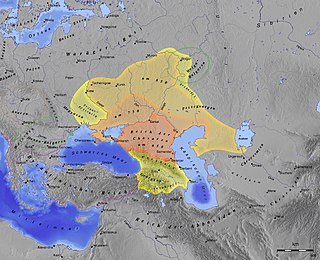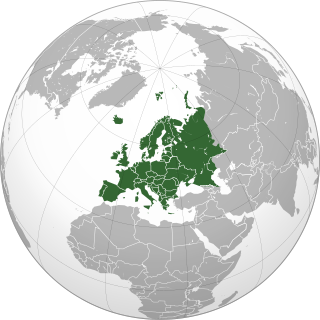Conversion of the Jews may refer to the:
Conversion of the Jews may refer to the:

The brit milah or bris is the ceremony of circumcision in Judaism and Samaritanism. According to the Book of Genesis, God commanded the biblical patriarch Abraham to be circumcised, an act to be followed by his male descendants on the eighth day of life, symbolizing the covenant between God and the Jewish people. Today, it is generally performed by a mohel on the eighth day after the infant's birth and is followed by a celebratory meal known as seudat mitzvah.

Judaism is an Abrahamic, monotheistic, and ethnic religion. It comprises the collective spiritual, cultural, and legal traditions of the Jewish people, having originated as an organized religion in the Middle East during the Bronze Age. Contemporary Judaism evolved from Yahwism, the cultic religious movement of ancient Israel and Judah, around the 6th/5th century BCE, and is thus considered to be one of the oldest monotheistic religions. Religious Jews regard Judaism as their means of observing the Mosaic covenant, which was established between God and the Israelites, their ancestors. Jewish religious doctrine encompasses a wide body of texts, practices, theological positions, and forms of organization.

The Khazars were a nomadic Turkic people that, in the late 6th-century CE, established a major commercial empire covering the southeastern section of modern European Russia, southern Ukraine, Crimea, and Kazakhstan. They created what for its duration was the most powerful polity to emerge from the break-up of the Western Turkic Khaganate. Astride a major artery of commerce between Eastern Europe and Southwestern Asia, Khazaria became one of the foremost trading empires of the early medieval world, commanding the western marches of the Silk Road and playing a key commercial role as a crossroad between China, the Middle East and Kievan Rus'. For some three centuries the Khazars dominated the vast area extending from the Volga-Don steppes to the eastern Crimea and the northern Caucasus.

Messianic Judaism is a modernist and syncretic movement of Protestant Christianity that incorporates some elements of Judaism and other Jewish traditions into the Christian movement of evangelicalism.
Proselytism is the policy of attempting to convert people's religious or political beliefs. Carrying out attempts to instill beliefs can be called proselytization.
Assimilation or Assimilate may refer to:
The Law of Return is an Israeli law, passed on 5 July 1950, which gives Jews, people with one or more Jewish grandparent, and their spouses the right to relocate to Israel and acquire Israeli citizenship. Section 1 of the Law of Return declares that "every Jew has the right to come to this country as an oleh [immigrant]". In the Law of Return, the State of Israel gave effect to the Zionist movement's "credo" which called for the establishment of Israel as a Jewish state. In 1970, the right of entry and settlement was extended to people with at least one Jewish grandparent and a person who is married to a Jew, whether or not they are considered Jewish under Orthodox interpretations of Jewish law.
Apostasy in Judaism is the rejection of Judaism and possible conversion to another religion by a Jew. The term apostasy is derived from Ancient Greek: ἀποστάτης, meaning "rebellious" Equivalent expressions for apostate in Hebrew that are used by rabbinical scholars include mumar, poshea Yisrael, and kofer. Similar terms are meshumad, and min or Epikoros, which denote heresy and the negation of God and Judaism, implying atheism.
Karaite Judaism or Karaism is a Jewish religious movement characterized by the recognition of the written Tanakh alone as its supreme authority in halakha and theology. Karaites believe that all of the divine commandments which were handed down to Moses by God were recorded in the written Torah without any additional Oral Law or explanation. Unlike mainstream Rabbinic Judaism, which regards the Oral Torah, codified in the Talmud and subsequent works, as authoritative interpretations of the Torah, Karaite Jews do not treat the written collections of the oral tradition in the Midrash or the Talmud as binding.

Conversion to Judaism is the process by which non-Jews adopt the Jewish religion and become members of the Jewish ethnoreligious community. It thus resembles both conversion to other religions and naturalization. The procedure and requirements for conversion depend on the sponsoring denomination. Furthermore, a conversion done in accordance with one Jewish denomination is not a guarantee of recognition by another denomination. Normally, though not always, the conversions performed by more stringent denominations are recognized by less stringent ones, but not the other way around. A formal conversion is also sometimes undertaken by individuals whose Jewish ancestry is questioned or uncertain, even if they were raised Jewish, but may not actually be considered Jews according to traditional Jewish law.

Over the centuries of Islamic history, Muslim rulers, Islamic scholars, and ordinary Muslims have held many different attitudes towards other religions. Attitudes have varied according to time, place and circumstance.
"Who is a Jew?" is a basic question about Jewish identity and considerations of Jewish self-identification. The question pertains to ideas about Jewish personhood, which have cultural, ethnic, religious, political, genealogical, and personal dimensions. Orthodox Judaism and Conservative Judaism follow Jewish law (Halakha), deeming people to be Jewish if their mothers are Jewish or if they underwent a halakhic conversion. Reform Judaism and Reconstructionist Judaism accept both matrilineal and patrilineal descent as well as conversion. Karaite Judaism predominantly follows patrilineal descent as well as conversion.
African-American Jews are people who are both African American and Jewish. African-American Jews may be either Jewish from birth or converts to Judaism. Many African-American Jews are of mixed heritage, having both non-Jewish African-American and non-Black Jewish ancestors. Many African-American Jews identify as Jews of color, but some do not. Black Jews from Africa, such as the Beta Israel from Ethiopia, may or may not identify as African-American Jews.

The Alhambra Decree was an edict issued on 31 March 1492, by the joint Catholic Monarchs of Spain ordering the expulsion of practising Jews from the Crowns of Castile and Aragon and its territories and possessions by 31 July of that year. The primary purpose was to eliminate the influence of practicing Jews on Spain's large formerly-Jewish converso New Christian population, to ensure the latter and their descendants did not revert to Judaism. Over half of Spain's Jews had converted as a result of the religious persecution and pogroms which occurred in 1391. Due to continuing attacks, around 50,000 more had converted by 1415. A further number of those remaining chose to convert to avoid expulsion. As a result of the Alhambra decree and persecution in the years leading up to the expulsion of Spain's estimated 300,000 Jewish origin population, a total of over 200,000 had converted to Catholicism to remain in Spain, and between 40,000 and 100,000 remained Jewish and suffered expulsion. An unknown number of the expelled eventually succumbed to the pressures of life in exile away from formerly-Jewish relatives and networks back in Spain, and so converted to Catholicism to be allowed to return in the years following expulsion.:17

The Bnei Menashe is a community of Indian Jews from various Tibeto-Burmese ethnic groups from the border of India and Burma who claim descent from one of the Lost Tribes of Israel; some of them have adopted Judaism. The community has around 10,000 members.

The history of the Jews in Europe spans a period of over two thousand years. Jews, an Israelite tribe from Judea in the Levant, began migrating to Europe just before the rise of the Roman Empire. Although Alexandrian Jews had already migrated to Rome, a notable early event in the history of the Jews in the Roman Empire was the 63 BCE siege of Jerusalem.
Forced conversion is the adoption of a religion or irreligion under duress. Someone who has been forced to convert to a different religion or irreligion may continue, covertly, to adhere to the beliefs and practices which were originally held, while outwardly behaving as a convert. Crypto-Jews, Crypto-Christians, Crypto-Muslims and Crypto-Pagans are historical examples of the latter.
Conversion or convert may refer to:
Marital conversion is religious conversion upon marriage, either as a conciliatory act, or a mandated requirement according to a particular religious belief. Endogamous religious cultures may have certain opposition to interfaith marriage and ethnic assimilation, and may assert prohibitions against the conversion of one their own claimed adherents. Conversely, they may require the marital conversion of those who wish to marry one of their adherents.
Many Christians believe in a widespread conversion of the Jews to Christianity, which they frequently consider an end-time event. Some Christian denominations consider the conversion of the Jews imperative and pressing, and as a result, they make it their mission to proselytize among them.